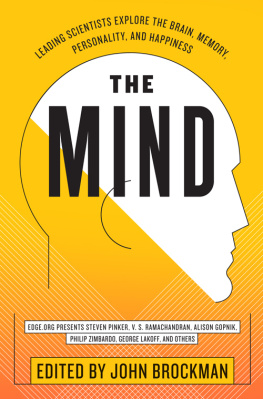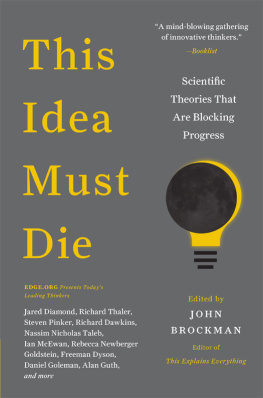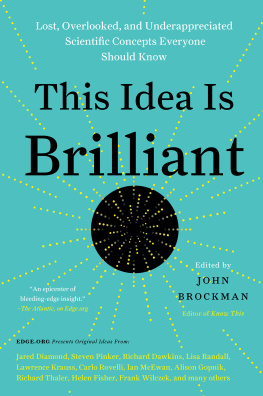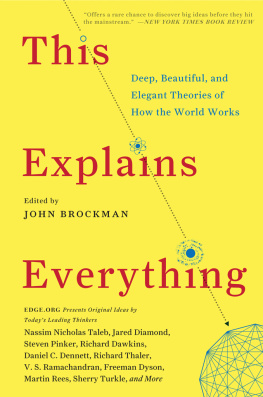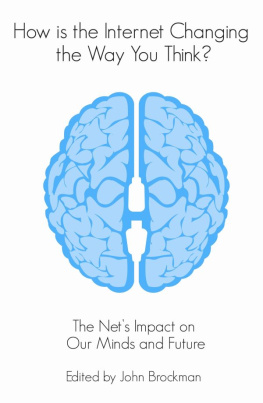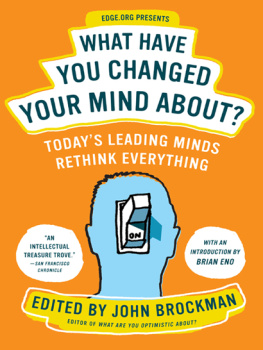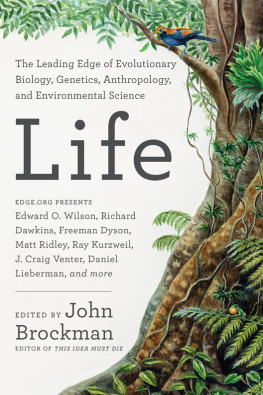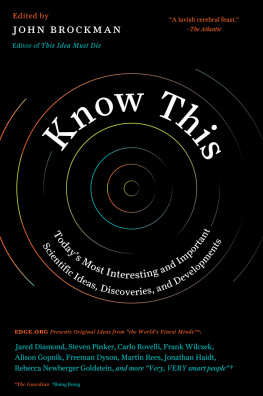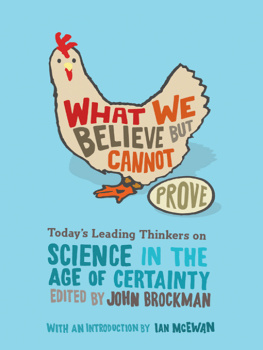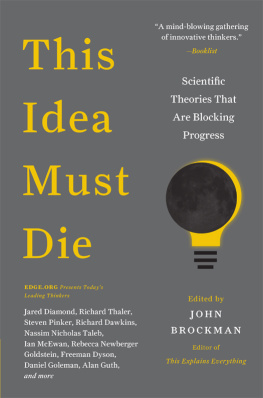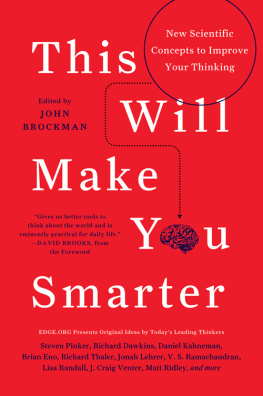The Mind
Leading Scientists Explore the Brain, Memory, Personality, and Happiness
Edited by John Brockman

Contents
Steven Pinker
Organs of Computation
George Lakoff
Philosophy in the Flesh
Joseph Ledoux
Parallel Memories: Putting Emotions Back into the Brain
Geoffrey Miller
Sexual Selection and the Mind
Steven Rose
Rescuing Memory
Frank Sulloway
How Is Personality Formed?
V. S. Ramachandran
Mirror Neurons and Imitation Learning as the Driving Force Behind
the Great Leap Forward in Human Evolution
Nicholas Humphrey
A Self Worth Having
Philip Zimbardo
You Cant Be a Sweet Cucumber in a Vinegar Barrel
V. S. Ramachandran
The Neurology of Self-Awareness
Martin Seligman
Eudaemonia: The Good Life
Stanislas Dehaene
What Are Numbers, Really? A Cerebral Basis for Number Sense
Simon Baron-Cohen
The Assortative Mating Theory
Robert Sapolsky
Toxo: The Parasite that Is Manipulating Human Behavior
Alison Gopnik
Amazing Babies
Stanislas Dehaene
Signatures of Consciousness
David Lykken
How Can Educated People Continue to Be Radical Environmentalists?
Jonathan Haidt
Moral Psychology and the Misunderstanding of Religion
I n summer 2009, during a talk at the Ideas Festival in Bristol, England, physicist Freeman Dyson articulated a vision for the future. Responding to the recent book The Age of Wonder , in which Richard Holmes describes how the first Romantic Age was centered on chemistry and poetry, Dyson pointed out that today a new Age of Wonder has arrived that is dominated by computational biology. Its leaders include genomics researcher Craig Venter, medical engineer Dean Kamen, computer scientists Larry Page and Sergey Brin, and software architect and mathematician Charles Simonyi. The nexus for this intellectual activity, he observed, is online at Edge.org.
Dyson envisions an age of biology where a new generation of artists, writing genomes as fluently as Blake and Byron wrote verses, might create an abundance of new flowers and fruit and trees and birds to enrich the ecology of our planet. Most of these artists would be amateurs, but they would be in close touch with science, like the poets of the earlier Age of Wonder. The new Age of Wonder might bring together wealthy entrepreneurs like Venter and Kamen... and a worldwide community of gardeners and farmers and breeders, working together to make the planet beautiful as well as fertile, hospitable to hummingbirds as well as to humans.
Indeed, Dyson was present at the August 2007 Edge meeting Life: What a Concept, where he and genomics researchers Craig Venter and George Church, biologist Robert Shapiro, exo-biologist and astronomer Dimitar Sasselov, and quantum physicist Seth Lloyd presented their new, and in more than a few cases, startling research, and/or ideas in the biological sciences. The meeting, according to Suedduetsche Zeitung , the largest national German newspaper, was one of those memorable events that people in years to come will see as a crucial moment in history. After all, its where the dawning of the age of biology was officially announced.
So, what is Edge.org?
First, Edge is people.
As the late artist James Lee Byars and I once wrote: To accomplish the extraordinary, you must seek extraordinary people. At the center of every Edge publication and event are remarkable people and remarkable minds. Edge , at its core, consists of the scientists, artists, philosophers, technologists, and entrepreneurs who are at the center of todays intellectual, technological, and scientific landscape.
Second, Edge is events. Through its special lectures, Master Classes, and annual dinners in California, London, Paris, and New York, Edge gathers together the third-culture scientific intellectuals and technology pioneers who are exploring the themes of the post-industrial age. In this regard, commenting about the 2008 Edge Master Class A Short Course in Behavioral Economics, science historian George Dyson wrote:
Retreating to the luxury of Sonoma to discuss economic theory in mid-2008 conveys images of fiddling while Rome burns. Do the architects of Microsoft, Amazon, Google, PayPal, and Facebook have anything to teach the behavioral economistsand anything to learn? So what? Whats new? As it turns out, all kinds of things are new. Entirely new economic structures and pathways have come into existence in the past few years.
It was a remarkable gathering of outstanding minds. These are the people that are rewriting our global culture.
Third, Edge.org is a conversation.
Edge is different from the Algonquin Roundtable or Bloomsbury Group, but it offers the same quality of intellectual adventure. Closer resemblances are the early 17th-century Invisible College, a precursor to the Royal Society. Its members consisted of scientists such as Robert Boyle, John Wallis, and Robert Hooke. The Societys common theme was to acquire knowledge through experimental investigation. Another inspiration is the Lunar Society of Birmingham, an informal club of the leading cultural figures of the new industrial ageJames Watt, Erasmus Darwin, Josiah Wedgwood, Joseph Priestley, and Benjamin Franklin.
The online Edge.org salon is a living document of millions of words that charts the Edge conversation over the past fifteen years wherever it goes. It is available, gratis, to the general public.
Edge.org was launched in 1996 as the online version of the Reality Club, an informal gathering of intellectuals that met from 19811996 in Chinese restaurants, artist lofts, the board rooms of Rockefeller University and the New York Academy of Sciences, and investment banking firms, ballrooms, museums, living rooms, and elsewhere. Though the venue is now in cyberspace, the spirit of the Reality Club lives on in the lively back-and-forth conversations on the hot-button ideas driving the discussion today.
In the words of the novelist Ian McEwan, Edge.org is open-minded, free ranging, intellectually playful... an unadorned pleasure in curiosity, a collective expression of wonder at the living and inanimate world... an ongoing and thrilling colloquium.
I n this, the first volume of The Best of Edge Series , we focus on ideas about Mind. We are pleased to present eighteen pieces, original works from the online pages of Edge.org, which consist of edited interviews, commissioned essays, and transcribed talks, many of which are accompanied online with streaming video. While theres no doubt about the value of online presentations, the role of books, whether bound and printed or presented electronically, is still an invaluable way to present important ideas. Thus, we are pleased to be able to offer this series of books to the public.
For this first volume, cutting-edge theoretical psychologists, cognitive scientists, neuroscientists, neurobiologists, linguists, behavioral geneticists, and moral psychologists explore new ways of thinking about Mind.
In Organs of Computation (1997), Harvard psychologist Steven Pinker argues that most of the assumptions about the mind that underlie current discussions are many decades out-of-date. He presents his idea that the basic understanding that the human mind is a remarkably complex processor of information, an organ of extreme perfection and complication, to use Darwins phrase, has not made it into the mainstream of intellectual life.
In Philosophy in the Flesh (1999), Berkeley cognitive scientist George Lakoff makes the point that we are neural beings. Our brains take their input from the rest of our bodies. What our bodies are like and how they function in the world thus structures the very concepts we can use to think. We cannot think just anythingonly what our embodied brains permit.
Next page
